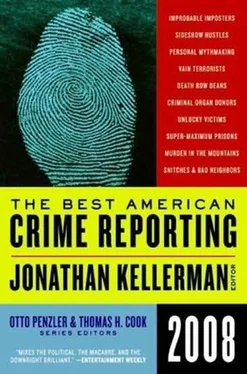By now, most of the red ribbons, many of them bleached pink by the harsh Maritime winter, have been taken down. Among the last to go were three or four bright-red towels that until recently were still draped around trees in the front yard of Carter Foster and Sara Wormell. They have decided to stay in Grand Manan for the time being, although they’d like to figure out a way to spend some of the winter months in British Columbia. By this time of year, tall stakes driven into the ocean floor have been connected with netting, a process sometimes called “suiting your weirs,” and people like Foster are getting up at a quarter to five every morning hoping to find the nets full of herring. The shed in back of their house has been repainted, but Foster can put his fingers in two bullet holes. At times, he has said that he wished he hadn’t been present on the night of the fights and the gunfire and the house-burning. He calls the twenty days he spent in jail awaiting bail the worst twenty days of his life. (“To me, that would have been a good enough sentence if I had done something really horrific.”) He has said that he’s haunted by the thought that he could have been killed or that he could have killed somebody else. On the other hand, he thinks that some good has come of the altercation with Ronnie Ross. “They’re talking about a center for the young people, and a paintball field,” Foster said recently. “There’s going to be some recreation for the young kids. The only recreation I had growing up was to go get drunk.”
Many islanders would agree with Carter Foster that Grand Manan is better off than it was before he and Ronnie Ross met in the middle of Cedar Street-or will be if the grants that the village has applied for come through. That opinion is often followed by “Of course, I don’t condone violence,” but it also might be followed by the observation that a smarter way to get rid of someone like Ronnie Ross would be to wait until he was out of the house some dark night, drop in a Molotov cocktail, and “run off into the woods like a rabbit.” Although there are still drug dealers on the island, none of them are outsiders who make themselves out to be big-time gangsters. There seems to be more focus on doing something about the drug problem. Now that Terry Irvine is no longer making regular visits in one S.U.V. or another, islanders are more relaxed about leaving tools unguarded-even though no evidence was ever presented that Irvine and Ross were behind the thefts. In fact, Irvine is in jail. This spring, in St. John, he pleaded guilty to stealing several thousand dollars’ worth of goods from three Atlantic Superstores, in full view of surveillance cameras-committing what his own lawyer summed up as “a rather stupid offense.”
And Ronald Ross is no longer a menacing presence on Grand Manan. His house is gone. Where it stood, there is simply an empty lot with some charred rubble. People see the end of his Grand Manan sojourn in varying ways. The Crown prosecutors believe, of course, that a mob put itself in the place of legally constituted authorities, while most residents of Grand Manan prefer to believe that islanders, regrettably, had to do what the R.C.M.P. seemed unwilling or unable to do. If it is true that the R.C.M.P. offered to turn a blind eye or even encouraged the violence, the legally constituted authorities could be said to have used the islanders as an unregulated auxiliary to get rid of Ronnie Ross. One resident of Cedar Street told the R.C.M.P. that, despite all the talk of drug problems, the eruption of violence was essentially part of a “personal war” between Ross and his neighbors-another way of saying that what really got Ronnie Ross put off Grand Manan was what Laura Buckley called his “asshole issues.”
At Ross’s trial in April, he was found guilty of the “ball of fire” threat but not guilty on the gun charge. (The judge, who heard the case without a jury, said that in his opinion the islanders at Foster’s assembled not for a peaceful intervention but in the hope that something would start so that they could finish it.) Ross, who had been confined to his father’s house in Nova Scotia since the previous summer, was sentenced to time served. After the sentencing, he told reporters that he might go back to Grand Manan once he is no longer prohibited from returning by the terms of his probation. A lot of people took that as just more Ronnie Ross bravura-when Mayor Greene was asked about it recently, he laughed-but Laura Buckley says that some people who know Ross believe that “he will actually have the brass balls to return.” Being an outsider and presumably not a student of history, after all, he may not realize that, in Marc Shell’s formulation, he has been banished.
CALVIN TRILLIN has been a staff writer for The New Yorker since 1963. For fifteen years, he did a New Yorker series called “U.S. Journal”-a three thousand word article from somewhere in the United States every three weeks. He is the author of twenty-five books, including Killings and American Stories .
Coda
In the summer, I live on the South Shore of Nova Scotia, so I heard reports on CBC radio about the incident on Grand Manan Island, just across the Bay of Fundy, in July 2006. The South Shore has some cultural similarities with Grand Manan. People in the village I live in have traditionally made their living from the sea-mainly lobstering in recent years, as the supply of ground fish became depleted. Law enforcement is provided by the Royal Canadian Mounted Police, headquartered in the nearest town large enough to have a drugstore and a supermarket-although in thirty-five summers the only Mountie I can recall seeing in our village was the one in ceremonial dress who was always present for the blessing of the fleet that used to be held on the government wharf every August. In other words, the presence of a menacing neighbor would present the same sort of problem for our village as it did for the residents of Grand Manan.
One difference, though, is that the South Shore is not an island. I’ve always been intrigued by islands-particularly islands that are relatively remote from mainland population centers. I’ve also been attracted to situations that are, for want of a better word, murky-situations in which the rights and wrongs are not obvious. So a murky situation on an island, involving people much like my summertime neighbors, was irresistible.
Alan Prendergast: THE CAGED LIFE
FROM Westword
WHEN THE GOON SQUAD showed up at his place at five in the morning, Tommy Silverstein knew something was up. He wasn’t accustomed to greeting guests at such an ungodly hour-much less a team of corrections officers, helmeted and suited up for action.
In fact, Silverstein wasn’t used to company at any hour. His home was a remote cell, known as the Silverstein Suite, in the special housing unit of the federal penitentiary at Leavenworth, Kansas. He’d been cut off from other inmates and all but a few emissaries from the outside world for more than two decades.
He stayed in the Silverstein Suite 23 hours a day. His interactions with staff typically amounted to some tight-lipped turnkey delivering his food through a slot in the cell door. The only change of scenery came when an electronic door slid open, allowing him an hour’s solitary exercise in an adjoining recreation cage. Visitors were rarely permitted, and entire years had gone by during which he never left the cell.
But this day was different. Silverstein could think of only a couple of reasons why so many well-padded, well-equipped officers would be at his door, ordering him to strip for a search. Cell shakedown? Time for a game of hockey, with Tommy as the puck? No, that was a captain leading the squad. Something big.
Читать дальше












